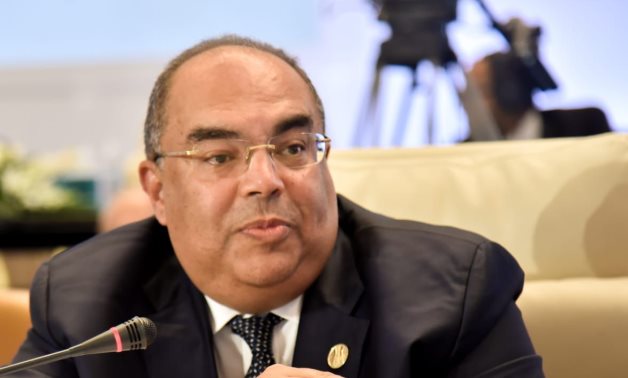
Mahmoud Mohieldin, UN Climate Change High Level Champion for Egypt and the UN Special Envoy on Financing 2030 Sustainable Development Agenda - Press photo
CAIRO - 9 November 2022: Mahmoud Mohieldin, UN Climate Change High Level Champion for Egypt and UN Special Envoy on Financing 2030 Sustainable Development Agenda, said that providing efficient and fair finance is the key to the actual implementation of climate action called for by COP27.
His remarks came during his participation in the Financing Day Opening Ceremony at COP27, with the participation of Mostafa Madbouly, Prime Minister; Mohamed Maait, Minister of Finance; Rania El-Mashat, Minister of International Cooperation; Kristalina Georgieva, Executive Director of the International Monetary Fund; David Malpass, President of the World Bank; Odile Renaud Basu, President of the European Bank for Reconstruction and Development; Mark Carney, UN Special Envoy for Climate Action and Finance; Zainab Ahmed, Minister of Finance of Nigeria; and Achim Steiner, Administrator of the United Nations Development Program.
Mohieldin stressed that there is a large funding gap for development and climate action in developing and emerging countries, estimated at $1.3 trillion until 2025 and this may increase to $2.4 trillion by 2030. "Commitment to financing climate action has become a necessity", he said.
Mohieldin explained that the pledge of the COP in Copenhagen to finance climate action in developing countries by $100 billion annually, has so far been fulfilled only by a few developed countries, explaining that the importance of fulfilling this pledge is that it paves the way for fulfilling more pledges, although this value does not represent more than 3% of the required finance.
Mohieldin said that public budgets of the developing countries bear 80% of the finance for development and climate action, while 60% of the climate finance is through debt, stressing in this context the importance of scaling up the participation of the private sector and national development banks in financing climate action, and the adoption of IDA standards for soft grants and loans that allow long-term repayment periods and low interest rates.
In this context, Mohieldin stressed the need to work on reducing debt and activating the debt swap for investment in climate and environmental projects. He noted that the initiative of the five regional forums launched by the Egyptian presidency of the COP27, in cooperation with the United Nations regional economic commissions and the team of High Level Champions of Climate Change witnessed good negotiations in this field.
The climate champion pointed out that the initiative of the five regional forums resulted in about 400 projects covering different dimensions of climate action, 50 of which will be presented during the COP27 in Sharm El-Sheikh, expressing his happiness with the agreement with the Glasgow Financial Alliance for Net Zero (GFANZ) to finance some of the projects that resulted from Africa Regional Forum.
Mohieldin highlighted the importance of activating innovative financing tools, expressing his happiness at the launch of the Africa Carbon Markets Initiative (ACMI) during the conference, which would enhance the ability of African countries to finance climate action.
He stressed the importance of promoting environmental, social and corporate governance practices in accordance with specific criteria to prevent the phenomenon of green washing and to ensure the commitment of companies and the private sector to play their role in environmental and social action.
Mohieldin praised the launching of the Sharm El-Sheikh Adaptation Agenda during the COP27, which provides sustainable financing of vital sectors, including food, agriculture, water, nature, coasts, oceans, human settlements and infrastructure, calling on parties and non-parties to participate in financing and implementing this important agenda.
He called for adopting a holistic approach that deals with poverty, food and health problems along with environmental and climate problems in one framework, noting the National Initiative for Smart Green Projects, launched by the Egyptian government, which aims to enhance the participation of various local actors in climate and development action, so that their results are reflected on all citizens in villages and cities.
The climate champion stressed the importance of credibility and trust building among all parties and actors with regard to financing and implementing climate action.

Comments
Leave a Comment